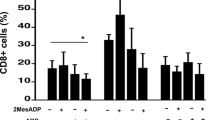Abstract By their potent antigen-presenting function, dendritic cells (DCs) play a crucial role in the initiation of T cell-mediated immunity, including allergic contact hypersensitivity. To acquire such potent antigen-presenting ability, DCs in tissue must be activated, with increased expression of costimulatory molecules. Recent progress in DC biology has demonstrated that DCs can be activated via a variety of substances, e.g. various cytokines, CD40 ligand, bacterial products, and haptens, to increase their antigen-presenting ability, probably by different mechanisms. Therefore, in this study, to elucidate the mechanisms underlying the efficacy of the immunosuppressive drugs dexamethasone (DEX), cyclosporine A (CY), and vitamin D3 (Vit D3) in the modulation of allergic contact hypersensitivity reactions, we examined the effects of these drugs on CD86 and HLA-DR antigen expression and TNFα secretion by monocyte-derived DCs stimulated with two representative haptens, NiCl2 and DNCB, in vitro. The augmented expression of CD86 induced by NiCl2 and DNCB was significantly suppressed by DEX at concentrations in the range 10–8 to 10–5 M, which include concentrations less than its therapeutically effective concentration of 10–7 M. Vit D3 also significantly suppressed NiCl2- and DNCB-induced augmented expression of CD86, at concentrations in the ranges 10–9 to 10–7 M and 10–10 to 10–7 M, respectively. In contrast, significant suppressive effects of CY on the NiCl2- or DNCB-induced augmented expression of CD86 were seen only at concentrations in the range 10–6 to 10–5 M, which are more than ten times higher than its effective concentration for T cell suppression. The augmented expression of HLA-DR antigen, which was only induced by stimulation with NiCl2, was resistant to treatment with these three drugs. Only DEX suppressed HLA-DR antigen expression at 10–5 M. TNFα secretion by stimulated DCs was suppressed by DEX and Vit D3, although their effects were not statistically significant. Thus DEX and Vit D3 could modulate allergic contact dermatitis by their clearly demonstrated suppressive effects on the activation of DCs by haptens.
Similar content being viewed by others
Author information
Authors and Affiliations
Additional information
Received 7 April 1999 / Received after revision: 16 June 1999 / Accepted: 25 June 1999
Rights and permissions
About this article
Cite this article
Singh, S., Aiba, S., Manome, H. et al. The effects of dexamethasone, cyclosporine, and vitamin D3 on the activation of dendritic cells stimulated by haptens. Arch Dermatol Res 291, 548–554 (1999). https://doi.org/10.1007/s004030050452
Issue Date:
DOI: https://doi.org/10.1007/s004030050452



